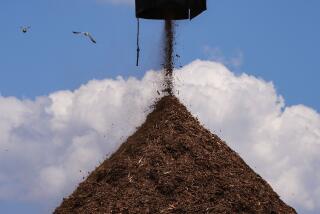Pulp Nonfiction: Mill Town’s Saga
- Share via
KETCHIKAN, Alaska — The mildly bitter smell of damp wood pulp hung in the air for the last time March 24 as this timber town in the nation’s biggest forest lost the industry that was its economic mainstay for 43 years.
Ketchikan Pulp Co. was wrapping up its final day of paper pulp production, leaving its own 500 employees and thousands of others who depend on the mill’s business pondering an uncertain future.
“A lot of people maybe will have to go work for McDonald’s to make a living, and that ain’t right,” said Rob Izatt, who worked at the mill for seven years and has found a construction job since taking an early severance package from Ketchikan Pulp.
The aging pulp mill, a money loser for Ketchikan Pulp owner Louisiana Pacific Corp. of Portland, Ore., was closed partly because the plant needed up to $200 million in environmental renovations and other improvements, the company said.
With severance pay amounting to a year’s wages or more for some longtime employees, many workers say they plan to take the summer off to fish, hunt and think about a new career.
“A lot of people are excited because we’re getting these big severance checks, but people downtown, a lot of the merchants are running scared,” said Mark Harris, a millworker for 11 years.
“I don’t think there’s one person on this island who won’t be affected by the pulp mill’s closure,” said Teresa Garland, who heads the chamber of commerce for the island city on the Alaska Panhandle, 200 miles south of Juneau.
*
Car and boat sales in town have plummeted; the tight, pricey housing market has been flooded with homes, and other businesses have cut back on staff and employees’ hours. David Curtis of Alaska Marine Lines said his company’s barges are hauling in about 20% less freight and shipping out more household belongings as people move away.
Problems probably will worsen over the next year or two as severance pay and unemployment benefits run out, business people say.
The sort of high-paying jobs the mill offered will be hard to find in the town of 15,000, where low-paying tourism jobs and seasonal seafood work account for much of the employment.
“That’s what the pulp mill’s always been in this town, a place to work,” said Paul Lamm, who quit the mill in 1981 to work construction, but returned in 1984. “Once you work there, as long as you didn’t do anything stupid, you knew you could always go back and get a job.”
The mill ran around-the-clock almost every day since 1954, except for brief maintenance shutdowns and a couple of labor disputes.
It was Alaska’s last pulp mill, an industry where production has gradually shifted overseas. Alaska Pulp Corp. closed its pulp mill in nearby Sitka and a sawmill in Wrangell over the past four years.
Both pulp companies had been nearing the end of 50-year contracts with the U.S. Forest Service to cut timber in the Tongass National Forest, deals the federal government struck in the 1950s to spur job development in Southeast Alaska’s isolated communities.
The last monster rolls of paper pulp came off the mill’s production lines last month. Workers stayed on the job anywhere from a week to a month doing mop-up chores, but management said virtually the entire work force should be laid off by the end of April.
The company is maintaining about 400 employees at two sawmills in Ketchikan and nearby Metlakatla. Federal foresters have guaranteed Ketchikan Pulp a three-year timber supply to keep those mills running.
*
Ketchikan Pulp’s managers said the shutdown was partly due to a lack of wood brought on by environmental lawsuits that tied up logging and a change in Clinton administration forest policies that made Tongass timber more scarce and costly.
“It’s a chapter that’s closing for this town,” said Allyn Hayes, pulp operations manager. “It’s a shame to see it end, because I don’t think it had to happen. I see plenty of forest to handle timber activity.”
Conservation groups said the company was a chronic polluter that dug its own grave by failing to keep the mill in compliance with environmental laws. The mill was repeatedly cited for air and water emissions and paid $6 million in penalties in 1995 for pollution violations.
Longtime mill workers said environmentalists’ criticism of the pulp business is part of a broader change in attitude against the timber industry.
“In the ‘60s, this town went out of its way to be nice to loggers,” said Gil Smith, who worked at the plant for 33 years. “They don’t do that now because they think the tourists don’t want to see loggers come into town and get drunk and fight. We’re just not a timber place anymore.”
More to Read
Sign up for Essential California
The most important California stories and recommendations in your inbox every morning.
You may occasionally receive promotional content from the Los Angeles Times.










